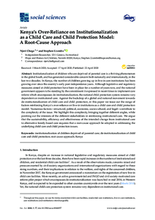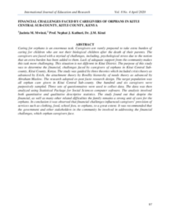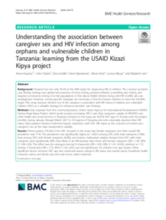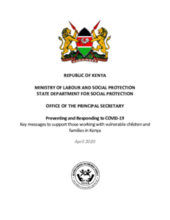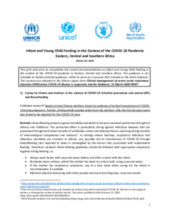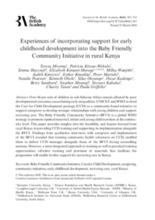Displaying 431 - 440 of 1617
In this online event, Family for Every Child members FSCE (Ethiopia), The Mulberry Bush (UK), Praajak (India) and CSID (Bangladesh) discussed children's care in the context of COVID-19.
This blog post from the UN Sustainable Development Group notes the rise in cases of gender-based violence (GBV) and violence against children (VAC) in Kenya, in light of the COVID-19 pandemic, and calls for immediate action to address this "shadow pandemic."
This study was carried out to determine the pattern of dermatological conditions and contributing factors among children living in orphanages in Dar es Salaam, Tanzania.
This paper teases out the range of factors reinforcing Kenya’s over-reliance on live-in institutions as a child care and child protection model.
The purpose of this study was to determine the financial challenges faced by caregivers of orphans in Kitui Central Subcounty, Kitui County, Kenya.
This study assesses whether sex of the caregiver is associated with HIV status of orphans and vulnerable children (OVC) as a valuable strategy for enhanced pediatric case findings.
The purpose of this report is to provide analysis and policy implications to assist the African Union (AU), Regional Economic Communities (RECs), Member States and Development Partners in decision-making and in the implementation of peace and security related instruments.
This guidance is designed to inform child protection actors in Kenya in light of the COVID-19 crisis. It guides actions targeting, and services provided for, vulnerable children and families, including children living in institutions, children living on the streets, children with disabilities, and others.
This joint note aims to consolidate the current recommendations on Infant and Young Child Feeding in the context of the COVID-19 pandemic in Eastern, Central and Southern Africa.
This paper provides insights into the feasibility and lessons learned from rural Kenya in providing Care for Child Development (CCD) training and supporting its implementation alongside the Baby Friendly Community Initiative (BFCI).


